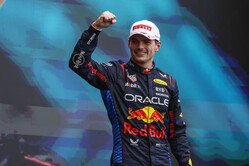


09/06/2024
NEWS STORY
 Max Verstappen has won the Canadian Grand Prix and it was one of the Red Bull driver's best victories ever, coming at the end of a race that had three different leaders - George Russell, Lando Norris and Max of course - from three different teams, Mercedes, McLaren and Red Bull. At some point in the race, Oscar Piastri (McLaren) and Lewis Hamilton (Mercedes) were also in the hunt, not just for a podium finish, but for the win itself, although they went on to finish fifth and fourth respectively.
Max Verstappen has won the Canadian Grand Prix and it was one of the Red Bull driver's best victories ever, coming at the end of a race that had three different leaders - George Russell, Lando Norris and Max of course - from three different teams, Mercedes, McLaren and Red Bull. At some point in the race, Oscar Piastri (McLaren) and Lewis Hamilton (Mercedes) were also in the hunt, not just for a podium finish, but for the win itself, although they went on to finish fifth and fourth respectively.
This was Max's 60th Formula 1 win, his third in a row in Montreal and the sixth of the season. It is Red Bull's 119th win, the fifth at this Grand Prix.
On the podium, the three drivers and the Red Bull Racing team representative sported a special edition of the classic Pirelli Podium Cap, designed specifically for this edition of the Montreal race. The cap is all-white with the Pirelli logo in red, while on the visor, there's the typical Canadian Maple leaf, which of course is also part of the national flag seen on the sides of the cap. In fact, the current flag was first raised above the Canadian Parliament building in the capital Ottawa on 15 February 1965.
The race got underway on a wet track. 18 drivers opted to start on Intermediates, while the Haas pair went with extreme wets. Indeed, Magnussen and Hulkenberg provided the show in the early stages of the race, as the blue banded Pirelli Cinturato Full Wet offered excellent grip in these conditions, so that both drivers were able to charge up the order, with the Dane even making it as high as fourth place by lap 3, having started 14th. However, the track was drying out rather quickly and so the American team's two drivers were the first obliged to pit for Intermediates, as their lap times had slowed considerably.
Then, in the second part of the race, the green-banded Pirelli Cinturato Intermediate was the tyre to have, as conditions alternated between rain and sunshine with the track drying, especially on the racing line, before getting wet again following another shower. The majority of drivers made the most of the first Safety Car period, forty minutes into the race, to switch to a second set of Intermediates, while a trio made up of Ocon, Tsunoda and Bottas, gambled on their tyres lasting long enough to extend the stint until the track was fit for slicks. Sauber's Finn went to lap 42, while Alpine's Frenchman and Racing Bulls' Japanese driver waited a further two laps. These three were the only drivers to complete the seventy lap race with only the one pit stop.
When slicks were viable, the majority (14) of drivers chose the Medium, thus looking for a better warm-up phase, while five went with the Hard, thinking more about wear, armed with the knowledge that in free practice, the Medium had suffered with graining.
Given the weather over the weekend at the Gilles Villeneuve circuit, it's no surprise that all tyres, the P Zero White hard, Yellow medium and Red soft, as well as the Cinturato Green Intermediate and the Cinturato Blue full wet, were put to good use. But they were not the only tyres in action, as the Ferrari Challenge P Zero and Ferrari Challenge were used by the cars in the Prancing Horse's eponymous one-make series, of which Pirelli has been the sole supplier, ever since it was established in 1993.
Mario Isola: "What a race! After the Monaco Grand Prix came in for criticism that, objectively, it was not exactly thrilling, Formula 1 answered its critics with an amazing show from the first to the last lap, with three drivers taking turns to lead and a further two also in with a chance of winning. Congratulations to Max for a great win, and also to all the other protagonists of this Canadian Grand Prix, because I reckon that everyone who loves this sport really enjoyed themselves.
"On the tyre front, we were able to see four of the five available types in action. Even the extreme wet, which usually is not used much, proved to be competitive on a low energy track with a lot of surface water. The Intermediate was also able to do very long stints, confirming its suitability for both very wet and almost dry conditions. As for the Hard and Medium, it's hard to say which worked best as the second Safety Car deprived us of being able to evaluate what might have been the price to pay in terms of degradation for those who had chosen the Medium to ensure more grip in the opening laps when the track was still damp."